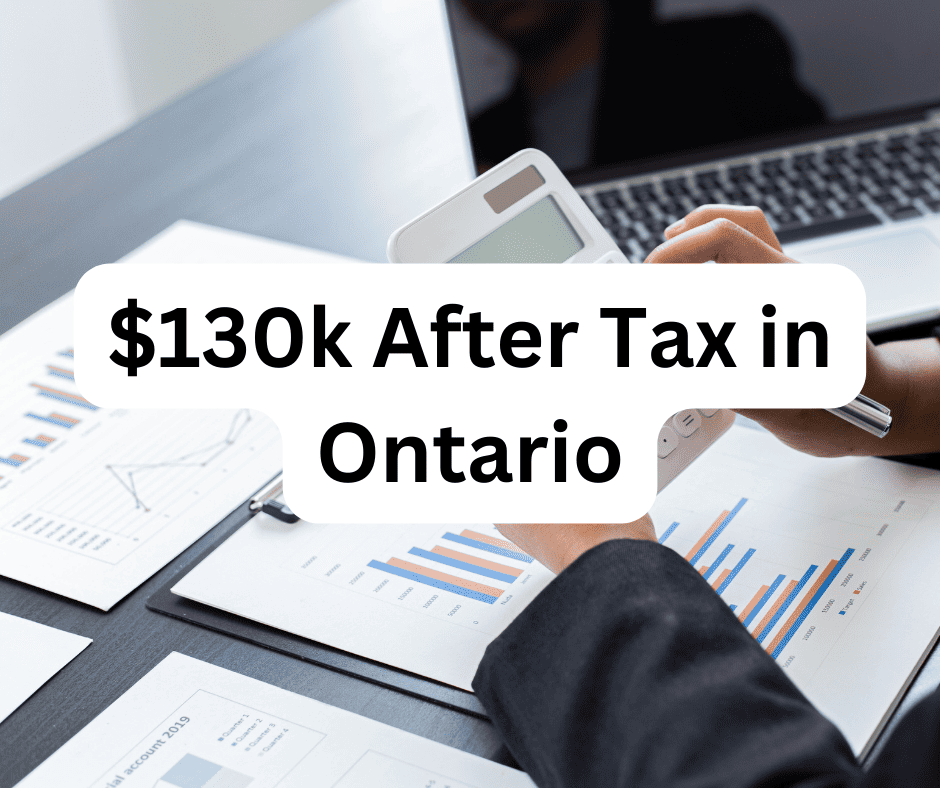Tax Rates and Take-Home Pay on $130k in Ontario
For an annual salary of $130,000 in Ontario, the total income tax and payroll deductions come out to around $39,000, leaving a net take-home pay of about $91,000 per year or $7,600 per month.
The average tax rate is around 30% and the marginal tax rate is 43.41%. This means for every additional $100 earned, $43.41 would go towards taxes, leaving $56.59 in additional net take-home pay.
Breakdown of Tax Rates
Here is a breakdown of the different tax rates on $130,000 per year in Ontario:
- Federal tax rate: 15% on the first $50,197 of taxable income, then 20.5% on the next $50,195, and 26% on the remaining income
- Ontario provincial tax rate: 5.05% on the first $45,142 of taxable income, then 9.15% on the next $45,143, and 11.16% on the remaining income
- Canada Pension Plan (CPP): 5.70% on up to $64,900 of pensionable earnings
- Employment Insurance (EI) premiums: 1.58% on up to $60,300 of insurable earnings
- Additional payroll taxes and surtaxes
After taking all these taxes into account, the total deductions come out to about 30% of the gross $130k salary.
Deductions and Take-Home Pay
The major deductions from a $130k salary in Ontario include:
- Federal and provincial income tax: $29,400
- CPP contributions: $3,700
- EI premiums: $950
- Additional payroll taxes and surtaxes: $5,000
Total Deductions: $39,050
Net Take-Home Pay = Gross Salary - Total Deductions = $130,000 - $39,050 = $90,950 per year ($7,580 per month)
So after all taxes and deductions, the annual take-home pay on $130k in Ontario works out to approximately $91,000, or around $7,600 per month.
Comparison to Other Provinces
Ontario has moderately high personal income tax rates compared to other Canadian provinces. Alberta and Quebec for example have lower tax rates on the same $130k income:
- Total deductions in Alberta: $36,100
- Net take-home pay in Alberta at $130k: $93,900
- Total deductions in Quebec: $39,600
- Net take-home pay in Quebec at $130k: $90,400
So Alberta has the highest take-home pay due to lower tax rates, followed by Ontario, and then Quebec. The differences between provinces is largely due to varying provincial tax rates.
Is $130k a Good Salary in Ontario?
A gross salary of $130,000 places someone solidly in the upper-middle class. It is significantly higher than the average salaries in Ontario:
- Average individual salary in Ontario: $53,950
- Average household income in Ontario: $106,500
So an income of $130k is considered well above average, and affords an upper-middle class lifestyle in Ontario.
With roughly $7,600 per month in take-home pay at this level, a single individual or couple should be able to live comfortably, although expensive cities like Toronto would have higher costs of living to consider.
Overall though, $130k is considered an objectively good salary, and puts earners in the top 15-20% of income earners in the province. It provides the ability to save and invest, purchase real estate, afford luxuries, and live a comfortable lifestyle. Higher incomes do offer more purchasing power and financial flexibility however.
In summary, $130k represents an above-average salary that places earners firmly in the upper-middle income class in Ontario. It enables a comfortable lifestyle, with the ability to meet all needs and afford some wants. Many would consider $130k a "good" salary, but higher wages do provide greater flexibility and purchasing power.

